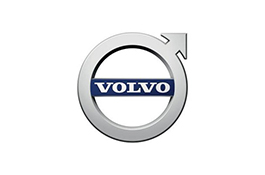february 22, 2019 - Volvo Cars
Volvo Cars introduces refreshed Volvo XC90 SUV
Volvo Cars has today unveiled a refreshed version of its best-selling #xc90 large #suv, the company’s flagship model, adding a newly developed fuel-saving engine option that marks the next step in the company’s ambitious electrification strategy.
The refreshed #xc90, for the first time, offers customers Volvo’s advanced kinetic energy-recovery braking system, which is coupled with its existing internal combustion engines to create a new integrated electrified powertrain, under its new ‘B’ badge.
This new electrified powertrain offers drivers up to 15 per cent fuel savings and emission reductions in real-world driving.
The new brake-by-wire system interacts with the energy-recovery system and reduces fuel consumption and emissions by recovering kinetic energy under braking.
The introduction of the new #xc90 ‘B’-badged cars represents a major step for #volvo Cars towards its electrification ambitions.
The new ‘B’-badged cars complement Volvo’s existing T8 Twin Engine plug-in hybrid electrified option on the new #xc90.
On the outside, the refreshed #xc90 offers subtle upgrades to the original award-winning exterior design such as new wheels, exterior colours and a modern new grille, among other details.
Based on Volvo’s own, in-house-developed platform, powertrain and safety technology, the 2015 #xc90 marked the start of #volvo Cars’ transformation. It introduced the new face of the #volvo brand, characterised by the Thor’s Hammer headlights, while introducing its new Scalable Product Architecture.
The world-first technologies and innovations that were launched on Volvo’s other 90 and 60 series models between 2015 and 2019 have also found their way into the #xc90 over the intervening years.
As a result, Volvo’s top-of-the-line #suv has become more advanced since its introduction, clocking up more than 320,000 units sold worldwide - and counting.
In terms of active safety technology, the #xc90 now offers drivers help with steering on both the City Safety and the Blind Spot Information System. City Safety with Autobrake is still the only system on the market to recognise pedestrians, cyclists and large animals.
The Oncoming Lane Mitigation system first introduced on the XC60 is now also available on #xc90, while the Cross Traffic Alert technology now also offers autobrake.
All this, together with the safety cage that forms the core of the passive safety technology, makes the #xc90 one of the safest cars on the road and underlines #volvo Cars’ unwavering commitment to developing the safest cars possible.
While the #xc90 was the first #volvo to offer Apple CarPlay integration, it is now also compatible with Android #auto. The Sensus infotainment system has gone through multiple updates in recent years, all of which have been adopted into the #xc90. Where available, the Spotify music streaming service is integrated in the #xc90.
The model-year 2020 version of the #xc90 will go into production in May at the Torslanda plant in Sweden. It will be available to order in the UK in mid-March, with first customer deliveries expected in late Q2 2019. Full pricing details will be announced shortly.
-ends-
-------------------------------
Volvo Car Group in 2018
For the 2018 financial year, #volvo Car Group recorded an operating profit of 14,185 MSEK (14,061 MSEK in 2017). Revenue over the period amounted to 252,653 MSEK (208,646 MSEK). For the full year 2018, global sales reached a record 642,253 (571,577) cars, an increase of 12.4 per cent versus 2017. The results underline the comprehensive transformation of #volvo Cars’ finances and operations in recent years, positioning the company for its next growth phase.
About #volvo Car Group
Volvo has been in operation since 1927. Today, #volvo Cars is one of the most well-known and respected car brands in the world, with sales of 642,253 cars in 2018 in about 100 countries. #volvo Cars has been under the ownership of the Zhejiang Geely Holding (Geely Holding) of China since 2010. It formed part of the Swedish #volvo Group until 1999, when the company was bought by Ford Motor Company of the US. In 2010, #volvo Cars was acquired by Geely Holding.
In 2018, #volvo Cars employed on average approximately 43,000 (39,500) full-time employees. #volvo Cars’ head office, product development, marketing and administration functions are mainly located in Gothenburg, Sweden. #volvo Cars’ head office for China is located in Shanghai. The company’s main car production plants are located in Gothenburg (Sweden), Ghent (Belgium), South Carolina (US), Chengdu and Daqing (China), while engines are manufactured in Skövde (Sweden) and Zhangjiakou (China), and body components in Olofström (Sweden).























































 Italian
Italian  Share
Share Share via mail
Share via mail  Automotive
Automotive Sport
Sport Events
Events Art&Culture
Art&Culture Design
Design Fashion&Beauty
Fashion&Beauty Food&Hospitality
Food&Hospitality Technology
Technology Nautica
Nautica Racing
Racing Excellence
Excellence Corporate
Corporate OffBeat
OffBeat Green
Green Gift
Gift Pop
Pop Heritage
Heritage Entertainment
Entertainment Health & Wellness
Health & Wellness